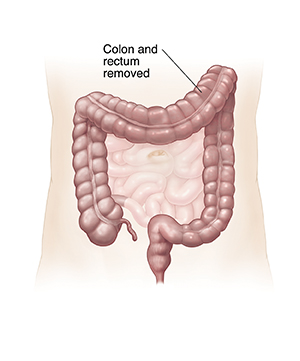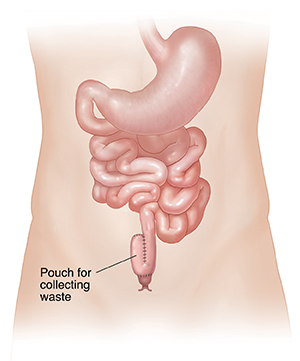Having Bowel Surgery: Ileoanal Pouch
This surgery is done to treat diseases of the digestive tract. It takes out all of the large intestine. When healed, bowel movements still occur through the anus.
The pouch is also called a J-pouch for the shape of the pouch.
Preparing for surgery
You'll start getting ready a few weeks before surgery. You may need to do the following:
-
If you smoke, get help from your healthcare provider to quit.
-
Tell your healthcare provider about any prescription or over-the-counter medicines you take. These include aspirin, nonsteroidal anti-inflammatory drugs (NSAIDs), such as ibuprofen, and blood thinners. Also tell your provider about any vitamins, herbs, or other supplements you take. Ask if you should stop taking any of them before surgery.
-
If you'll have a stoma, a specially trained healthcare provider called an enterostomal therapy (ET) nurse or a wound-ostomy-continence (WOC) nurse will meet with you. This nurse will talk with you about the stoma location on the belly (abdominal) wall. They'll tell you how to care for it after surgery.
-
Follow any directions you're given for taking medicines and for not eating or drinking before surgery. This includes any instructions for bowel prep.
The procedure
-
The colon and rectum are taken out.
-
The anus and nearby muscles are left in place.
-
Part of the small intestine is reshaped to form a pouch in the body. The pouch works like a rectum. It stores waste until a bowel movement occurs.
-
A short-term (temporary) ileostomy may be needed as the intestine heals. This is a procedure that lets waste pass into a pouch outside the body.


Risks and possible complications
Bowel surgery has some risks and possible complications. Your healthcare provider can talk about them with you. They may include:
-
Infection
-
Injury to nearby organs
-
An anastomosis that leaks
-
Blood clots
-
Risks from the anesthesia
-
Pouch inflammation or malfunction
-
Scar tissue forms that blocks the bowel (adhesions)
-
Internal bleeding
Diarrhea is very common after surgery. Over a few weeks or months, the bowel gets closer to normal. But most people end up with more frequent and softer bowel movements than before. Sometimes a bowel movement occurs overnight. If your healthcare provider thinks the pouch may have a problem, they can put a flexible tube (a scope) inside it to look around and find out what's wrong.
© 2000-2025 The StayWell Company, LLC. All rights reserved. This information is not intended as a substitute for professional medical care. Always follow your healthcare professional's instructions.